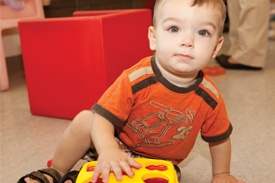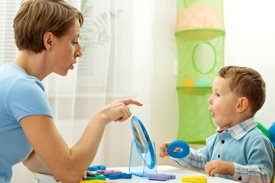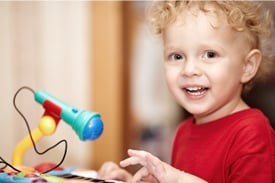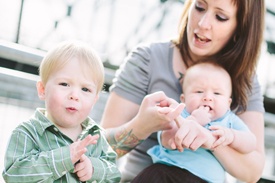Children begin developing speech as an infant. By 6 months, babies coo and play with their voices by producing sounds such as "oo," "uh," "mm," "da," and "goo." Children learn speech by imitating the sounds they hear. Actions such talking about what you are doing during the day, singing songs and reading books expose your child to a variety of sounds that he or she will begin imitating.
The Stages of Infant Speech Development
Tags: Speech, Language, Communication, Voice, talking
Can You Understand Your Child's Speech?
It’s common for most children to make some mistakes as they learn to say new words. Different sounds are mastered at different ages. Consistent, correct sound production will vary from child to child. When mistakes continue past a certain age, that’s when it's considered a speech sound disorder. Speech sound disorders include problems with articulation (pronouncing sounds correctly) and phonological processes (errors with sound patterns).
Tags: Speech, Language, Communication, Voice, toddler, talking
How Hearing Loss Affects Speech-Language Development
Children learn to talk by listening to those around them. The first few years of life are a critical time for speech and language development. Children must be able to hear speech clearly in order to learn language. Fluctuating hearing loss due to repeated ear infections might mean the child doesn't hear consistently and may be missing out on critical speech information. Permanent hearing loss will also affect speech and language development, especially if it is not detected early. The earlier hearing loss is identified and treated, the more likely the child will develop speech and language skills on par with children who aren’t experiencing hearing issues.
Tags: Speech, Hearing Aid, Hearing Aids, Communication, Hearing, Deaf, Hard of Hearing, Hearing Loss, Learning, Voice, toddler, talking
Should My Child Learn a Second Language?
Introducing your child to multiple languages at a young age is a personal decision that can be challenging for many families. Children who become fluent in one language are referred to as “monolingual,” and children who become fluent in two languages are referred to as “bilingual.” Speaking a language at home that is different than what your child may be exposed to at school and in the community can spark several questions such as “Will it be difficult for my child to learn another language?” “When should I start to teach my child two languages?” “How can I help my child learn a second language if I don’t know it myself?”
How to Prepare for an Upcoming Speech-Language Evaluation
A speech and language evaluation is a normal avenue to pursue when parents or caregivers suspect difficulty with communication. Anticipation of a speech and language evaluation can bring on feelings of stress if you aren’t sure what to expect, and meeting a new health-care professional in an unfamiliar office space can be overwhelming.
Tags: Speech, Language, Communication, Teens, Voice, toddler, talking
Great Apps to Practice Speech Sounds with Your Tween
Learning and practicing how to correctly produce their “r” or “s” sound is certainly NOT what 8-12-year-olds want to be doing! Most would prefer to be playing video games or riding their bike. One way to make speech therapy and at-home practice a little easier is to use an app. These apps could be on the parent’s phone, the tween’s phone, or a family iPad.
Tags: Speech, Language, Communication, Teens, Stuttering, Learning, Voice, talking
Common Communication Difficulties of Stroke Survivors
Suffering from a stroke can be a scary and challenging experience, causing brain damage that may lead to communication difficulties with language, speech, voice, cognition and even swallowing.
Tags: Speech, Language, Communication, Stroke, Voice
Social & Communication Skills in Children
Social skills are the ways we use our language skills in social situations. Social communication is important in developing effective interpersonal skills and is critical to various aspects of our daily life. Social skills are important in childhood and adulthood. What is the relationship between social skills and speech-language skills/disorders?
Tags: Speech, Language, Communication, Learning, Voice
Children's Language Disorders & Treatments
Tags: Speech, Language, Communication, Learning, Voice
What is Language - and How Does It Develop?
Language is the basis for all learning. Children first learn to communicate through eye contact, crying, vocalizing and gesturing. As they grow, they learn the language around them. Children then learn about their world through language by talking, playing and reading; parents and teachers use various forms of language to help children learn. Later, children learn about language as they grow older.
Tags: Speech, Language, Communication, Hearing, Learning, Voice
















